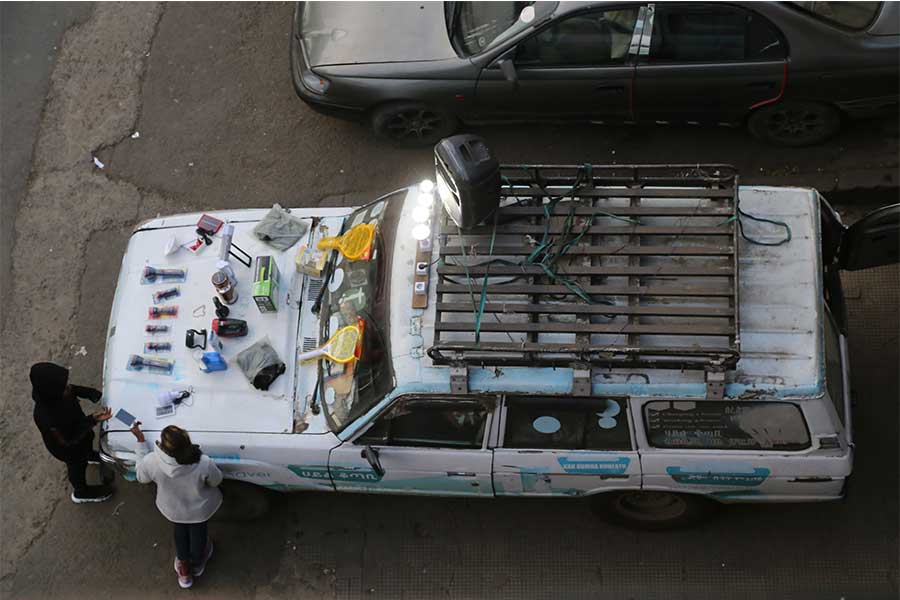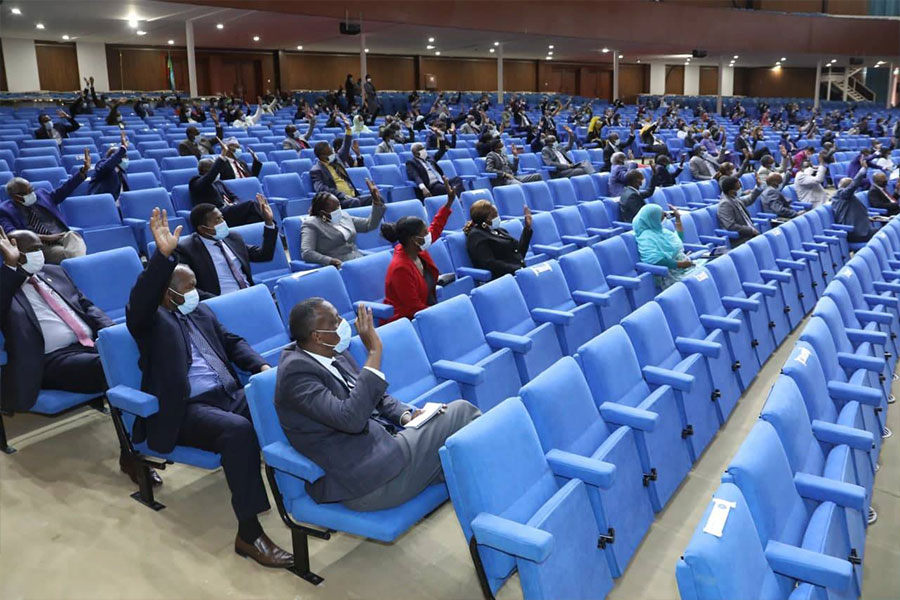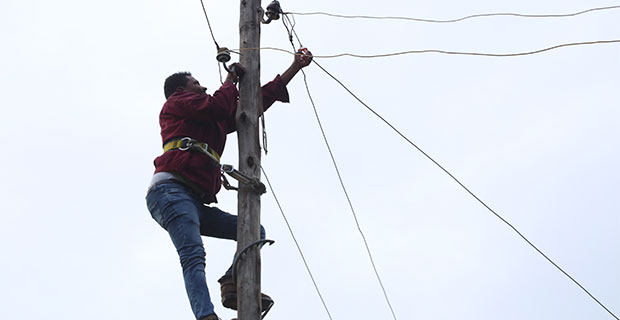
Jan 25 , 2020.
The last assembly of legislators under the Dergue, the Shengoas it was known then, was nothing less than an admirable show of courage by representatives in standing up against a totalitarian power that had grown too comfortable in offering up excuses. As rebel forces advanced on the capital and as Mengistu Hailemariam (Col.), then president, was mulling fleeing the country, members of the Shengo expressed the fear and frustration the public felt at an increasingly uncertain political fate.
Hailu Araya (PhD), a member of the Shengo, was one of the handful who displayed courage in the face of power with impunity. He had confronted Mengistu over his administration’s lack of openness and inability to take criticism in good faith. Hailu lambasted the Marxist-military government for not keeping its promise to hold candid discussions and pleaded with strongman Mengistu to allow the public to express its voice.
Perhaps even more memorable was that of a priest. A member of the Shengo, he had called out Mengistu on the rumours that surfaced of his plan to flee the country.
In the years that followed that assembly, parliament under the EPRDF fell into a dispassionate, if not less relevant, mode concerning Ethiopia`s politics. Even in the instances where opposition party members managed to win a few seats, nothing much came out of a hall that was endowed with awesome constitutional powers, except a few amusing remarks that were delivered wryly.
While the country remained relatively stable, the ruling party was wholly cohesive; expressions of opposition to the executive were sanctioned, and MPs' reticence was intolerable.
Parliamentarians' passivity in the face of turmoil ought to have been what led Melaku Habtewold, a government official, to reflect on what went wrong. Opining in Ethiopia Insights, Melaku says: "The courts should be courts; and, parliament really should be parliament."
It appears that no one takes a cue from his piece of advice. As political chaos continues unabated; the ruling party is loosely held together; when the voices of opposition to the administration are growing deafening; and society is increasingly polarised parliamentarians’ passivity has consequences beyond weakening democracy. It puts the country at a loss in its search for dependable leadership.
There have been multiple cases in the past few months that should have given Tagesse Chafo, speaker of the house, and MPs cause for taking the executive to task on its weak performance, if not its dismissive attitude.
Only last week, Prime Minister Abiy Ahmed (PhD) "appointed" ministers to fill seats in the Council of Ministers, an act in direct breach of the Constitution's provisions under Article 74/2. It is parliament's role to appoint members for the cabinet, as well as commissioners, presidents for the Supreme Court, judges for federal courts and the Auditor General, who are nominated by the Prime Minister, under Article 74/7.
It will be consequential to a constitutional order should parliament pass this on without holding the administration accountable on its lapses. It will have to be its duty to remind the Prime Minister that the same article obliges him to "obey and enforce" the Constitution.
Nonetheless, parliamentarians have already been mute over a series of developments across the country that caused pain and suffering among citizens.
The most recent of these, and perhaps most contextual of the political state of the country, was the unrest in public higher learning institutions over the past few months. As a result, over 35,000 students have fled their campuses, as Hirut Woldemariam (PhD), minister of Science & Higher Education, recently conceded.
The instability in public universities is a stark reminder that the Constitution’s promise of freedom of movement and the right to reside in any place of one’s choice is not guaranteed. It is evocative of the displacement of millions of people last year, showing that the crisis is deep and nationwide. In the face of it, removing the leadership of the institutions was the equivalent of putting a Band-Aid over a gunshot wound.
There is a bright side to the chaotic state of the country and the sense of despair that has gripped the nation. It can be found in the plethora of individuals, groups and institutions speaking out against the administration’s failure to ensure the safety of citizens and how the administration dodges questions. The media, civic organisations, activists, opposition parties and the communities in the diaspora are all clamouring for an improvement in crisis management and conflict prevention.
It is also to the credit of this administration that these voices are empowered. It is admirable that, despite daily political mud-slinging, non-state affiliated figures and organisations have been resourceful in calling for attention to injustices that would have remained unaddressed if the incumbent had its way.
For all their resourcefulness, these voices are in the end, merely voices. They are powerless over the state. They can only entice; but, they cannot force the administration, the law enforcement establishment or any of the regional and federal agencies to answer questions, reorient their priorities or carry out their duties with more considerable attention.
The Armed Conflict Locations & Event Data Project (ACLED) is a US-based non-profit organisation active in recording and analysing conflicts across the world. Data on conflicts that occurred in Ethiopia in 2019 shows that there were close to 300 conflicts, mainly protests but with a considerable number of armed conflicts as well. They claimed the lives of over 650 people, mostly civilians.
However, the executive was under no legislative obligation to explain itself to the media, opposition parties or civic societies. But it does not mean that it is above the law.
Framers of Ethiopia's existing Constitution, emulating their liberal democracy-inspired counterparts in the Western parts of the world, have included a provision under which the executive should be held accountable, mainly through Parliament.
Legislators are imbued with powers only a parliamentary system can offer. Any day, MPs can call a session and remove the Prime Minister or any of the members of his cabinet. A less severe show of force would be to compel the Prime Minister or any other federal official to appear before parliament to answer questions. If it is not confident with their conduct, parliament can “take decisions or measures it deems necessary."
Parliament can even extend its arms and, through a joint session with the House of Federation, take measures against state authorities unable to arrest human rights violations within their jurisdiction.
But a legislative body is only as powerful as the courage of its members in exercising their constitutional duty and powers. Not surprisingly, but sadly, parliamentarians have chosen to take a backseat as the country unravels and the House falls into further irrelevance.
Part of the problem could be the normalisation of the idea of a weak and insignificant legislative body. The executive has shone so brightly in Ethiopia’s political history, it is rare to see MPs play the most significant part if they choose to use the constitutional powers at their disposal. By virtue of their historical passivity, they are not believed to carry half of the responsibilities the executive is regularly criticised for.
The subsequent absence of pressure on MPs to exercise their power to account for the executive has removed a sense of responsibility from a compelling body of the state. The burden does not seem to lie on their shoulders, hence the lack of urgency to act.
The lack of opposition in parliament, except for the TPLF now, also plays a factor. Within the party structure, the incumbents in the executive are, in most cases, their bosses. Even more critically, MPs of the ruling party lack the incentive to grill their party leaders, negatively impacting the image of the party, which would be bad for their standing as elections in August 2020 draw nearer.
But it has always been the hallmark of democracies to put constitutional order over partisan agenda. MPs can take a page out of the courage of the two Shengomembers that once called out a leader who reigned over a government far more intolerant of dissent than the current one. Democracy was never meant to mature under an environment where the goodwill, the forbearance or the earnestness to maintain ultimate loyalty to the electorate did not exist.
If indeed MPs of today maintain that their responsibility is to the public that voted for them, instead of the party that has sponsored their elections, they would grill the administration over its inability or unwillingness to arrest the breakdown of law and order across the country. Then parliament will be parliament!
PUBLISHED ON
Jan 25,2020 [ VOL
20 , NO
1030]

Life Matters | Jun 12,2021

In-Picture | Oct 19,2019

Sunday with Eden | Jan 21,2023

Agenda | Jun 12,2021

View From Arada | Jun 19,2021

Radar | Dec 21,2019

Sunday with Eden | May 25,2019

Commentaries | May 25,2019

Sunday with Eden | Jun 22,2024

Fortune News | Sep 08,2019

My Opinion | 131458 Views | Aug 14,2021

My Opinion | 127810 Views | Aug 21,2021

My Opinion | 125791 Views | Sep 10,2021

My Opinion | 123426 Views | Aug 07,2021

Dec 22 , 2024 . By TIZITA SHEWAFERAW
Charged with transforming colossal state-owned enterprises into modern and competitiv...

Aug 18 , 2024 . By AKSAH ITALO
Although predictable Yonas Zerihun's job in the ride-hailing service is not immune to...

Jul 28 , 2024 . By TIZITA SHEWAFERAW
Unhabitual, perhaps too many, Samuel Gebreyohannes, 38, used to occasionally enjoy a couple of beers at breakfast. However, he recently swit...

Jul 13 , 2024 . By AKSAH ITALO
Investors who rely on tractors, trucks, and field vehicles for commuting, transporting commodities, and f...

Jun 29 , 2025
Addis Abeba's first rains have coincided with a sweeping rise in private school tuition, prompting the city's education...

Jun 29 , 2025 . By BEZAWIT HULUAGER
Central Bank Governor Mamo Mihretu claimed a bold reconfiguration of monetary policy...

Jun 29 , 2025 . By BEZAWIT HULUAGER
The federal government is betting on a sweeping overhaul of the driver licensing regi...

Jun 29 , 2025 . By NAHOM AYELE
Gadaa Bank has listed 1.2 million shares on the Ethiopian Securities Exchange (ESX),...